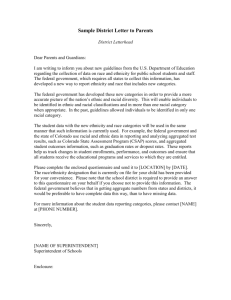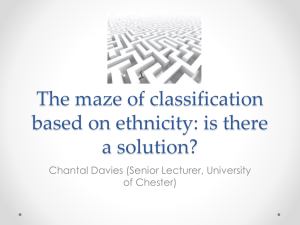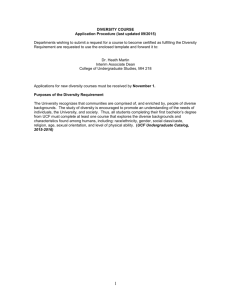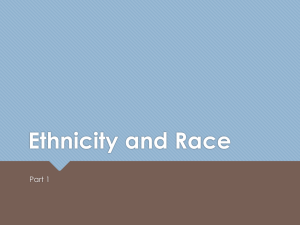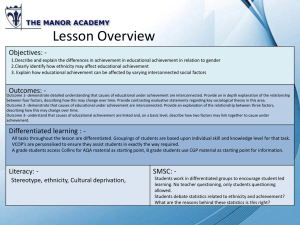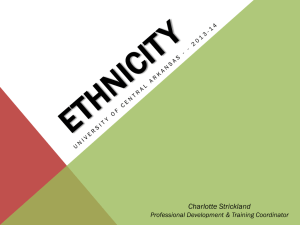Sample Self assessment form
advertisement
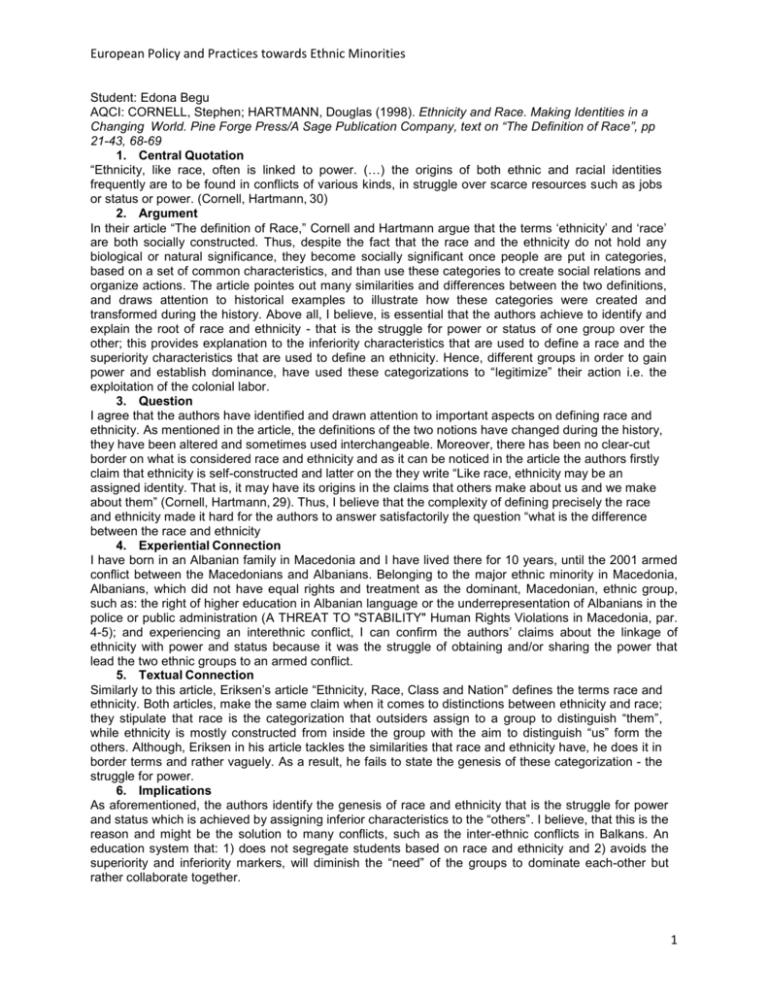
European Policy and Practices towards Ethnic Minorities Student: Edona Begu AQCI: CORNELL, Stephen; HARTMANN, Douglas (1998). Ethnicity and Race. Making Identities in a Changing World. Pine Forge Press/A Sage Publication Company, text on “The Definition of Race”, pp 21-43, 68-69 1. Central Quotation “Ethnicity, like race, often is linked to power. (…) the origins of both ethnic and racial identities frequently are to be found in conflicts of various kinds, in struggle over scarce resources such as jobs or status or power. (Cornell, Hartmann, 30) 2. Argument In their article “The definition of Race,” Cornell and Hartmann argue that the terms ‘ethnicity’ and ‘race’ are both socially constructed. Thus, despite the fact that the race and the ethnicity do not hold any biological or natural significance, they become socially significant once people are put in categories, based on a set of common characteristics, and than use these categories to create social relations and organize actions. The article pointes out many similarities and differences between the two definitions, and draws attention to historical examples to illustrate how these categories were created and transformed during the history. Above all, I believe, is essential that the authors achieve to identify and explain the root of race and ethnicity - that is the struggle for power or status of one group over the other; this provides explanation to the inferiority characteristics that are used to define a race and the superiority characteristics that are used to define an ethnicity. Hence, different groups in order to gain power and establish dominance, have used these categorizations to “legitimize” their action i.e. the exploitation of the colonial labor. 3. Question I agree that the authors have identified and drawn attention to important aspects on defining race and ethnicity. As mentioned in the article, the definitions of the two notions have changed during the history, they have been altered and sometimes used interchangeable. Moreover, there has been no clear-cut border on what is considered race and ethnicity and as it can be noticed in the article the authors firstly claim that ethnicity is self-constructed and latter on the they write “Like race, ethnicity may be an assigned identity. That is, it may have its origins in the claims that others make about us and we make about them” (Cornell, Hartmann, 29). Thus, I believe that the complexity of defining precisely the race and ethnicity made it hard for the authors to answer satisfactorily the question “what is the difference between the race and ethnicity 4. Experiential Connection I have born in an Albanian family in Macedonia and I have lived there for 10 years, until the 2001 armed conflict between the Macedonians and Albanians. Belonging to the major ethnic minority in Macedonia, Albanians, which did not have equal rights and treatment as the dominant, Macedonian, ethnic group, such as: the right of higher education in Albanian language or the underrepresentation of Albanians in the police or public administration (A THREAT TO "STABILITY" Human Rights Violations in Macedonia, par. 4-5); and experiencing an interethnic conflict, I can confirm the authors’ claims about the linkage of ethnicity with power and status because it was the struggle of obtaining and/or sharing the power that lead the two ethnic groups to an armed conflict. 5. Textual Connection Similarly to this article, Eriksen’s article “Ethnicity, Race, Class and Nation” defines the terms race and ethnicity. Both articles, make the same claim when it comes to distinctions between ethnicity and race; they stipulate that race is the categorization that outsiders assign to a group to distinguish “them”, while ethnicity is mostly constructed from inside the group with the aim to distinguish “us” form the others. Although, Eriksen in his article tackles the similarities that race and ethnicity have, he does it in border terms and rather vaguely. As a result, he fails to state the genesis of these categorization - the struggle for power. 6. Implications As aforementioned, the authors identify the genesis of race and ethnicity that is the struggle for power and status which is achieved by assigning inferior characteristics to the “others”. I believe, that this is the reason and might be the solution to many conflicts, such as the inter-ethnic conflicts in Balkans. An education system that: 1) does not segregate students based on race and ethnicity and 2) avoids the superiority and inferiority markers, will diminish the “need” of the groups to dominate each-other but rather collaborate together. 1 European Policy and Practices towards Ethnic Minorities Sample Self assessment form Department of Public and Social Policy, Faculty of Social Sciences, Charles University AQCI ASSESSMENT FORM Student’s name: Edona Begu Name of assessor: Date: Essay title: Excel lent 1) Is the chosen quotation central to the author’s argument? Go od Aver age Po or Not accept able Comments + + 2) Has the main argument been fully understood (including its ‘for’ and ‘against’ sides, if applicable)? + 3a) Is the question raised important/relevant/interesting? 3b) Has this question not been fully answered in the text? + + 4) Is the experiential connection relevant/interesting? + 5a) Is the textual connection relevant/interesting? 5b) Has it been cited properly? 5c) Has it been adequately explained how the present text's argument contrasts with, contradicts, confirms, clarifies, or elaborates the other text's argument or point? + + + 6) Have the implications been well understood, can they have a practical impact for policy making? + 7) Expression/Presentation a) Are the style, grammar and general use of English adequate? b) Is the AQCI professionally presented? + + Essay grade: Further comments: 2 European Policy and Practices towards Ethnic Minorities References ERIKSEN (Thomas H.), (1996) “Ethnicity, Race, Class and Nation”, in HUTCHINSON (John) and SMITH (Anthony), eds., Ethnicity, O.U.P., Oxford, p. 28 – 31 Human Rights Watch. A THREAT TO "STABILITY" Human Rights Violations in Macedonia. Printed in the United States of America. Accessed 13 October 2015]. Available from: http://www.hrw.org/reports/1996/Macedoni.htm 3
